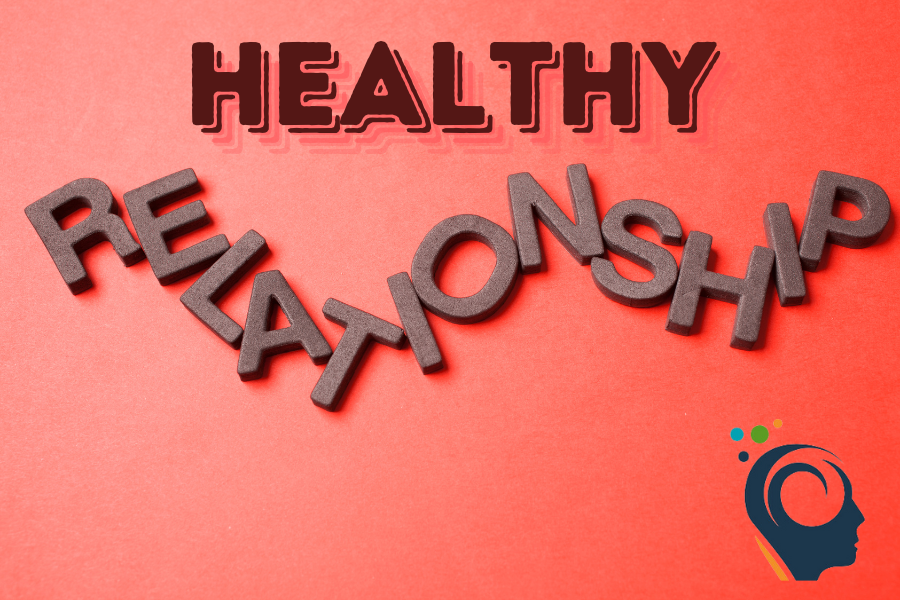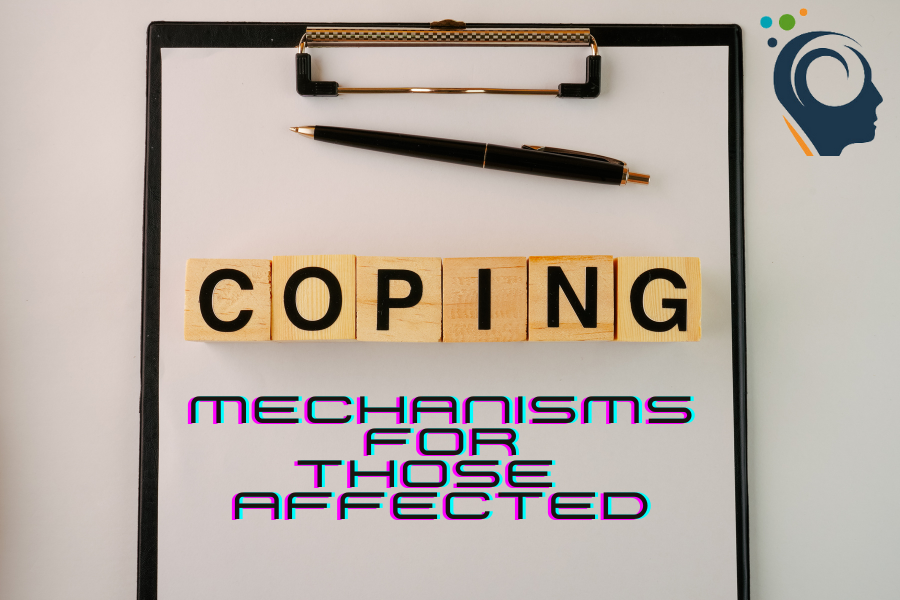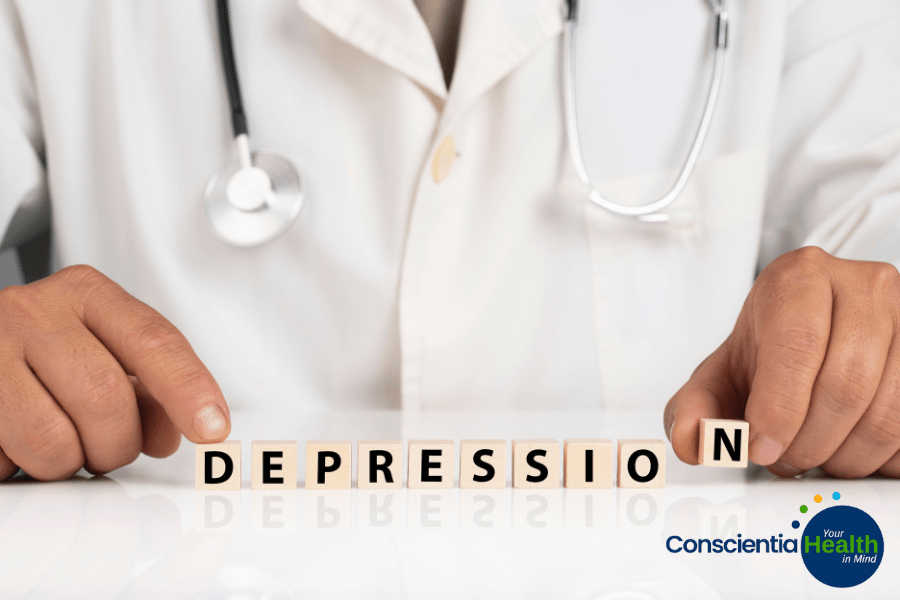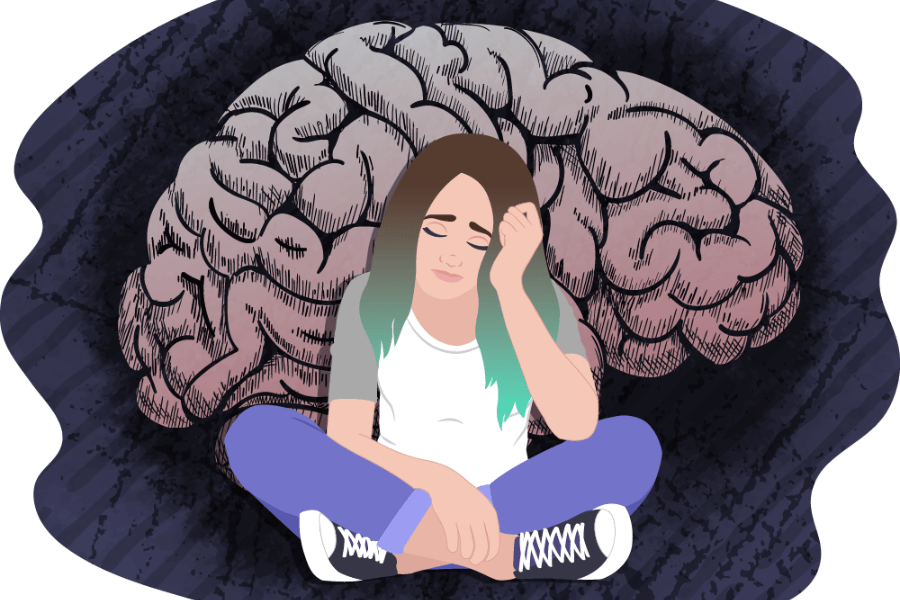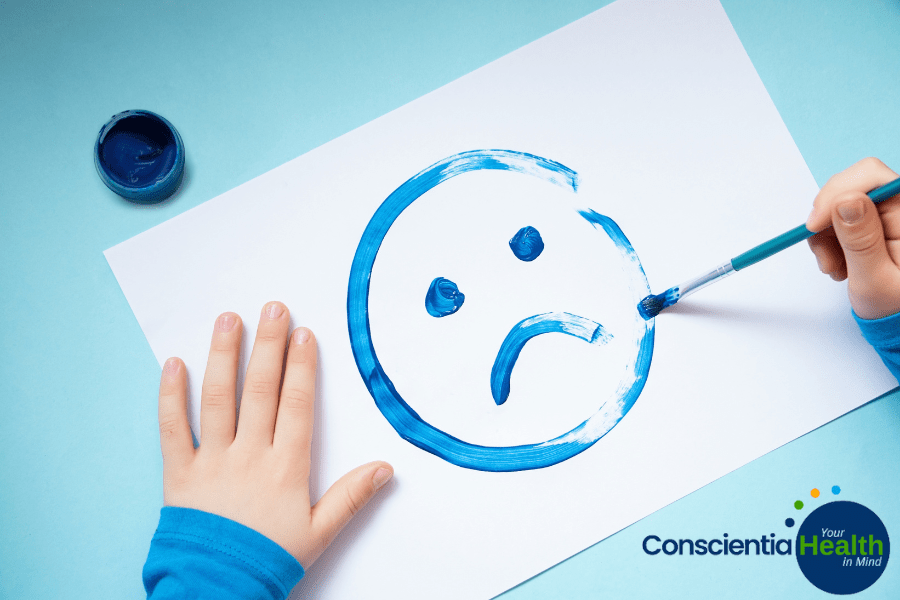Depression affects over 280 million people worldwide, yet many struggle to recognize when their feelings have crossed the line from temporary sadness into something more serious. Whether you're experiencing persistent low moods, losing interest in activities you once enjoyed, or simply feeling "off" for weeks on end, understanding depression symptoms and knowing how to seek help can be life-changing.
At Conscientia Health, we specialize in comprehensive depression care, offering evidence-based treatments tailored to your unique needs. Our team understands that taking the first step toward getting help requires courage, and we're here to support you every step of the way.
In this comprehensive guide, we'll walk through the common signs and symptoms of depression, help you understand the difference between clinical depression and normal sadness, and provide practical first steps you can take today. Most importantly, we'll show you that depression is highly treatable, and with the right support—whether through therapy, lifestyle changes, medication management, or a combination of approaches—the vast majority of people experience significant improvement.

Taking time to reflect on your mental health is an important step in recognizing when you might need professional support.
What is Depression?
Depression, formally known as Major Depressive Disorder (MDD), is far more than just feeling sad or having a rough week. It's a serious medical condition that affects how you think, feel, and behave, impacting your mood, thoughts, physical health, and daily functioning. According to the National Institute of Mental Health, depression is one of the most common mental health conditions in the United States.
Unlike temporary emotional responses to life's challenges, clinical depression persists for at least two weeks and significantly interferes with your ability to work, study, maintain relationships, or take care of yourself. It's important to understand that depression is not a personal weakness or character flaw—it's a legitimate medical condition with biological, psychological, and social components.
Depression can manifest in different ways and severities:
- Episodic depression: Distinct periods of depressive symptoms followed by recovery
- Persistent depressive disorder: Chronic, long-term depression lasting two years or more
- Mild to severe spectrum: Symptoms can range from manageable to completely debilitating
The encouraging news is that depression is highly treatable. At Conscientia Health, we offer comprehensive mental health services designed to address all aspects of depression, from initial evaluation to ongoing treatment and support.
Ready to Take the First Step?
If you're recognizing signs of depression in yourself or a loved one, don't wait to seek help. Early intervention can make a significant difference in recovery outcomes.
Schedule Your Evaluation
Common Symptoms of Depression
Depression symptoms can vary significantly from person to person, but there are several key indicators that mental health professionals look for when diagnosing the condition. It's important to note that experiencing one or two of these symptoms occasionally is normal—it's the persistence, intensity, and combination of multiple symptoms over at least two weeks that may indicate clinical depression.
If you identify with several of these symptoms and they've been present most days for two weeks or longer, it may be time to consider seeking professional evaluation through Conscientia Health's comprehensive psychiatric evaluation services.
Mood and Emotional Symptoms
The emotional hallmarks of depression often include:
- Persistent sadness or emptiness: A deep, ongoing feeling of sadness that doesn't lift, even during normally enjoyable moments
- Anhedonia: Loss of interest or pleasure in activities you once enjoyed, including hobbies, social activities, or intimate relationships
- Feelings of hopelessness: A pervasive sense that things will never get better or that you're trapped in your current situation
- Irritability or restlessness: Feeling easily frustrated, agitated, or having a short temper with others
- Overwhelming guilt or worthlessness: Excessive self-criticism, feeling like a burden to others, or ruminating on past mistakes
- Anxiety or worry: Many people with depression also experience anxiety symptoms, creating a cycle of distressing thoughts
Cognitive and Mental Symptoms
Depression significantly impacts thinking patterns and mental clarity:
- Difficulty concentrating: Trouble focusing on tasks, making decisions, or remembering information
- Negative thinking patterns: Persistent pessimistic thoughts about yourself, your future, and the world around you
- Mental fog: Feeling like your thoughts are slow, confused, or unclear
- Rumination: Repetitive, intrusive thoughts about problems, mistakes, or worries
- Thoughts of death or suicide: Recurring thoughts about dying, death, or ending your life
🚨 Immediate Help Available
If you're having thoughts of self-harm or suicide, please reach out for immediate help. In the U.S., call or text 988 for the Suicide & Crisis Lifeline, or call 911 for emergency services. You matter, and help is available 24/7.
You can also contact Conscientia Health's crisis support team for immediate professional guidance.
Physical and Biological Symptoms
Depression isn't just "in your head"—it creates real, measurable changes in your body:
- Chronic fatigue: Feeling exhausted even after adequate rest, or lacking energy for basic daily activities
- Sleep disturbances: Insomnia, frequent waking, early morning awakening, or sleeping too much (hypersomnia)
- Appetite changes: Significant weight loss or gain due to decreased or increased appetite
- Physical aches: Unexplained headaches, back pain, muscle aches, or digestive issues
- Psychomotor changes: Either feeling slowed down and lethargic, or agitated and restless
- Decreased libido: Reduced interest in sexual activity or intimacy
Behavioral and Social Symptoms
Depression often changes how we interact with the world around us:
- Social withdrawal: Avoiding friends, family, and social activities you previously enjoyed
- Declining performance: Struggles at work, school, or in maintaining household responsibilities
- Neglecting self-care: Poor hygiene, not taking medications, or ignoring health needs
- Increased substance use: Using alcohol, drugs, or other substances to cope with feelings
- Procrastination and avoidance: Putting off important tasks or responsibilities
Recognizing these symptoms is the first step toward recovery. The American Psychological Association emphasizes that early recognition and treatment lead to better outcomes and faster recovery times.

A professional mental health evaluation can help identify depression symptoms and create an effective treatment plan tailored to your needs.
Depression vs. Normal Sadness: Understanding the Difference
One of the most common questions people ask is: "How do I know if what I'm experiencing is depression or just normal sadness?" This distinction is crucial because it helps determine when to seek professional help and what type of support you might need.
Duration and Persistence
Normal sadness typically:
- Improves over time, especially as circumstances change
- Comes and goes in waves, with periods of feeling better
- Usually has a clear trigger or cause
- Doesn't typically last more than a few days to a couple of weeks
Clinical depression, however:
- Persists for at least two weeks, often much longer
- Remains relatively constant, with little day-to-day variation
- May occur without any obvious trigger or precipitating event
- Doesn't improve significantly even when circumstances change for the better
Intensity and Impact on Functioning
While sadness can be intense, it typically doesn't completely disrupt your ability to function. You might feel sad about a breakup or job loss, but you can still maintain basic self-care, work performance, and relationships. Depression, on the other hand, significantly impairs your ability to function in one or more major life areas.
If you're unsure whether your symptoms constitute clinical depression, Conscientia Health offers professional depression screening to help clarify your situation and recommend appropriate next steps.
Range and Scope of Symptoms
Normal sadness primarily affects mood and emotions. Depression is much broader, affecting:
- Physical health and energy levels
- Cognitive functioning and concentration
- Sleep and appetite patterns
- Interest in previously enjoyable activities
- Social relationships and work performance
According to Mayo Clinic research, the key difference lies in the pervasive nature of depression—it colors every aspect of your life, not just your emotional state.
Still Not Sure?
If you're questioning whether your symptoms might be depression, that's actually a good sign—it means you're paying attention to your mental health. When in doubt, it's always better to err on the side of caution and seek professional evaluation.
Get Professional Clarity
First Steps If You Think You're Depressed
Recognizing potential depression symptoms can feel overwhelming, but taking action—even small steps—can begin to shift the trajectory toward healing. Here are practical, manageable first steps you can take starting today.
1. Talk to Someone You Trust
Depression thrives in isolation and secrecy. One of the most powerful things you can do is break the silence by talking to someone you trust about what you're experiencing. This might be:
- A close friend or family member
- A trusted colleague or mentor
- A religious or spiritual leader
- A support group member
Simply articulating your feelings can provide relief and help you gain perspective on your situation. The person you choose doesn't need to have all the answers—sometimes just having someone listen without judgment is incredibly healing.
2. Seek Professional Evaluation
While talking to friends and family is valuable, a professional evaluation is essential for accurate diagnosis and treatment planning. You have several options:
- Primary Care Physician: Your family doctor can conduct initial screening and provide referrals
- Licensed Therapist or Psychologist: Specialized in mental health assessment and psychotherapy
- Psychiatrist: Medical doctor specializing in mental health who can prescribe medications
- Comprehensive Mental Health Clinic: Offers integrated care with multiple specialists
Conscientia Health's new patient resources can help you understand what to expect during your first appointment and how to prepare for the most productive evaluation possible.
3. Track Your Symptoms
Before your professional appointment, spend 1-2 weeks tracking your symptoms, mood patterns, and daily functioning. Note:
- Daily mood ratings (on a scale of 1-10)
- Sleep patterns and quality
- Energy levels throughout the day
- Appetite and eating patterns
- Social activities and interactions
- Any triggers or patterns you notice
This information will be invaluable to your healthcare provider and can help ensure a more accurate diagnosis and appropriate treatment recommendations.
4. Rule Out Medical Causes
Sometimes what appears to be depression can actually be caused or exacerbated by underlying medical conditions. Common medical causes of depression-like symptoms include:
- Thyroid disorders (hypo- or hyperthyroidism)
- Anemia or other blood disorders
- Vitamin deficiencies (especially B12, D, and folate)
- Chronic medical conditions (diabetes, heart disease, autoimmune disorders)
- Medication side effects
- Hormonal changes (menopause, postpartum, etc.)
A comprehensive medical evaluation can identify and treat these underlying causes, potentially improving your mental health symptoms significantly.
5. Take Small Steps to Reduce Isolation
While seeking professional help, you can begin taking small steps to counter depression's tendency toward isolation:
- Send a text message to one person you care about
- Take a short walk outside, even just around the block
- Attend one social activity, even if you don't feel like it
- Join an online support group or forum
- Volunteer for a cause you care about, even for an hour
These actions might feel difficult when you're depressed, but the National Alliance on Mental Illness emphasizes that behavioral activation—taking action even when you don't feel like it—is one of the most effective strategies for breaking the depression cycle.
Evidence-Based Treatment Options
Depression is one of the most treatable mental health conditions, with numerous evidence-based approaches that have been proven effective through decades of research. The key is finding the right combination of treatments that work for your specific situation, symptoms, and lifestyle.
Psychotherapy: The Foundation of Depression Treatment
Psychotherapy, also known as talk therapy, is often the first-line treatment for mild to moderate depression and an essential component of treatment for more severe cases. Several therapeutic approaches have strong research support:
Cognitive Behavioral Therapy (CBT)
CBT is one of the most extensively researched and effective treatments for depression. This approach helps you identify and change negative thought patterns and behaviors that contribute to depression. Key components include:
- Identifying and challenging negative automatic thoughts
- Behavioral activation and activity scheduling
- Problem-solving skills training
- Relapse prevention strategies
Interpersonal Therapy (IPT)
IPT focuses on improving relationships and communication patterns that may be contributing to depression. This approach is particularly effective for depression related to:
- Grief and loss
- Relationship conflicts
- Life transitions
- Social skill deficits
Behavioral Activation
This approach focuses on increasing engagement in meaningful and enjoyable activities, helping to counteract the withdrawal and avoidance that characterize depression. It's particularly effective for people who have lost interest in previously enjoyable activities.
Conscientia Health's experienced therapists are trained in these evidence-based approaches and work with you to determine which therapeutic style best fits your needs and preferences.
Medication Management
Antidepressant medications can be highly effective, especially for moderate to severe depression or when psychotherapy alone isn't sufficient. Common classes of antidepressants include:
Selective Serotonin Reuptake Inhibitors (SSRIs)
Often considered first-line medications due to their effectiveness and relatively mild side effect profile. Examples include sertraline (Zoloft), fluoxetine (Prozac), and escitalopram (Lexapro).
Serotonin-Norepinephrine Reuptake Inhibitors (SNRIs)
These medications affect both serotonin and norepinephrine systems and can be particularly effective for people with both depression and anxiety. Examples include venlafaxine (Effexor) and duloxetine (Cymbalta).
Other Medication Classes
When SSRIs and SNRIs aren't effective, other options include atypical antidepressants, tricyclic antidepressants, and MAOIs, each with specific benefits and considerations.
Important considerations about antidepressant treatment:
- Medications typically take 4-6 weeks to reach full effectiveness
- Side effects are usually most prominent in the first few weeks
- Finding the right medication may require trying several options
- Regular follow-up with a prescriber is essential for monitoring and adjustments
Conscientia Health's psychiatric providers specialize in carefully managing antidepressant treatment, working closely with you to optimize benefits while minimizing side effects.
Lifestyle and Complementary Approaches
While not treatments in themselves, lifestyle modifications can significantly enhance the effectiveness of therapy and medication:
Exercise and Physical Activity
Regular exercise has been shown to be as effective as medication for some people with mild to moderate depression. Harvard Medical School research demonstrates that exercise:
- Increases production of mood-boosting neurotransmitters
- Reduces inflammation associated with depression
- Provides a sense of accomplishment and control
- Offers opportunities for social interaction
Sleep Hygiene
Addressing sleep disturbances is crucial for depression recovery. Key strategies include:
- Maintaining consistent sleep and wake times
- Creating a relaxing bedtime routine
- Limiting screen time before bed
- Addressing underlying sleep disorders
Nutrition and Diet
While no specific diet cures depression, certain nutritional approaches can support mental health:
- Mediterranean-style diet rich in omega-3 fatty acids
- Regular meals to maintain stable blood sugar
- Adequate hydration
- Limiting alcohol and caffeine
Combined Treatment Approaches
Research consistently shows that for moderate to severe depression, combining psychotherapy with medication management often produces the best outcomes. The American Psychiatric Association recommends this integrated approach because:
- Medications can provide symptom relief while therapy builds long-term coping skills
- Therapy can help address medication adherence and side effect management
- Combined treatment reduces relapse rates compared to either treatment alone
- Different aspects of depression may respond better to different treatment modalities
Conscientia Health specializes in integrated care, coordinating therapy and medication management to provide comprehensive, personalized treatment for each individual.

Self-care practices like mindfulness and connecting with nature can complement professional treatment and support your mental health recovery journey.
Self-Care Practices You Can Start Today
While professional treatment is essential for clinical depression, there are many self-care strategies you can implement immediately to support your mental health and complement your treatment plan. These practices won't cure depression on their own, but they can provide significant relief and help accelerate your recovery process.
Set Micro-Goals and Celebrate Small Wins
Depression can make even simple tasks feel overwhelming. Breaking large goals into tiny, achievable steps can help rebuild your sense of competence and control:
- Instead of: "I need to clean my entire house"
- Try: "I'll wash three dishes" or "I'll make my bed"
- Instead of: "I need to exercise regularly"
- Try: "I'll walk to the end of my street" or "I'll do five jumping jacks"
- Instead of: "I need to reconnect with all my friends"
- Try: "I'll send one text message to one person"
Each small accomplishment builds momentum and challenges depression's narrative that you're incapable or worthless.
Practice Pleasant Activity Scheduling
Depression steals joy from activities you once enjoyed, but intentionally scheduling pleasant activities—even if you don't feel like doing them—can help restore positive feelings over time. This technique, called behavioral activation, is a cornerstone of effective depression treatment.
Start by:
- Making a list of activities you used to enjoy or think you might enjoy
- Rating each activity from 1-10 based on how achievable it feels right now
- Starting with activities rated 3-5 (challenging but not overwhelming)
- Scheduling one small pleasant activity each day
- Doing the activity even if you don't feel like it
- Noting your mood before and after the activity
Challenge Negative Thought Patterns
Depression creates a filter that makes everything seem negative, hopeless, or your fault. Learning to identify and gently challenge these thoughts can reduce their power over your mood:
Common Depression Thought Patterns:
- All-or-nothing thinking: "I'm a complete failure" vs. "I struggled with this task, but I've succeeded at others"
- Mental filtering: Focusing only on negatives while ignoring positives
- Personalization: Blaming yourself for things outside your control
- Fortune telling: Assuming the worst possible outcome will occur
Gentle Thought Challenging:
- "Is this thought definitely true, or is it a depression thought?"
- "What would I tell a good friend who had this thought?"
- "What evidence supports and contradicts this thought?"
- "Is there a more balanced way to look at this situation?"
Cultivate Compassionate Self-Talk
The way you talk to yourself matters enormously when you're depressed. Depression often amplifies your inner critic while silencing your inner supporter. Practice treating yourself with the same kindness you'd show a good friend:
- Instead of: "I'm so lazy and worthless"
- Try: "I'm struggling right now, and that's understandable. I'm doing the best I can."
- Instead of: "I should be over this by now"
- Try: "Healing takes time, and everyone's journey is different. I'm making progress."
- Instead of: "I'm a burden to everyone"
- Try: "The people who care about me want to support me, just as I would want to support them."
Create a "Worry Window"
Depression often comes with excessive worry and rumination. Rather than trying to suppress these thoughts entirely (which usually backfires), designate a specific 15-20 minute "worry window" each day:
- Set a timer for your designated worry time
- Write down all your worries and concerns
- When the timer goes off, stop and engage in a different activity
- If worries arise outside your window, remind yourself: "I'll think about this during my worry time"
- This helps contain anxious thoughts rather than letting them dominate your entire day
Reduce All-or-Nothing Expectations
Depression often makes us believe that if we can't do something perfectly, we shouldn't do it at all. This leads to procrastination and avoidance, which typically makes depression worse. Instead:
- Aim for "good enough" rather than perfect
- Remember that partial progress is still progress
- Celebrate effort, not just results
- Give yourself permission to have "off" days without judging yourself
These self-care practices work best when combined with professional treatment. Conscientia Health offers additional self-help resources and can help you develop a personalized self-care plan that complements your professional treatment.
When to Seek Urgent Help
While most depression can be treated on an outpatient basis with regular therapy and medication management, there are certain situations that require immediate professional intervention. Recognizing these warning signs—both in yourself and others—can be life-saving.
Immediate Danger Signs
Seek emergency help immediately if you or someone you know is experiencing:
- Active suicidal thoughts or plans: Thinking about specific ways to harm yourself, making plans, or gathering means
- Homicidal thoughts: Thoughts about harming others or specific plans to do so
- Severe psychotic symptoms: Hallucinations, delusions, or complete break from reality
- Severe self-harm behaviors: Cutting, burning, or other self-injurious behaviors that are escalating
- Complete inability to care for yourself: Unable to eat, drink, maintain hygiene, or ensure basic safety
Urgent (Within 24-48 Hours) Situations
Contact a mental health professional or crisis service within 24-48 hours if experiencing:
- Rapidly worsening depression: Symptoms escalating quickly over days or weeks
- Passive suicidal thoughts: Wishing you were dead or wouldn't wake up, even without specific plans
- Severe isolation: Complete withdrawal from all social contact for several days
- Inability to function: Cannot work, attend school, or manage basic responsibilities for multiple days
- Substance abuse escalation: Using alcohol or drugs to cope, with usage increasing rapidly
- Severe anxiety or panic: Overwhelming anxiety that interferes with basic functioning
Crisis Resources and Support
United States Crisis Resources:
- 988 Suicide & Crisis Lifeline: Call or text 988 for 24/7 support (available in English and Spanish)
- Crisis Text Line: Text HOME to 741741
- Emergency Services: Call 911 for immediate medical emergency
- National Suicide Prevention Lifeline: 1-800-273-8255 (still operational alongside 988)
The 988 Suicide & Crisis Lifeline provides free, confidential support 24/7 for people in suicidal crisis or emotional distress, as well as resources for friends and family members.
What to Expect When Seeking Crisis Help
If you need to seek urgent mental health care, here's what you can typically expect:
Emergency Room Visit:
- Medical screening to rule out physical causes
- Mental health evaluation by a psychiatrist or crisis counselor
- Safety assessment and planning
- Possible brief hospitalization if you're at immediate risk
- Discharge planning with outpatient follow-up appointments
Crisis Hotline Call:
- Confidential conversation with a trained crisis counselor
- Immediate emotional support and validation
- Safety planning and coping strategies
- Referrals to local mental health resources
- Follow-up calls if requested
Supporting Someone in Crisis
If you're concerned about someone else who may be in crisis:
- Take it seriously: Don't dismiss threats or warning signs
- Listen without judgment: Provide a safe space for them to express their feelings
- Don't leave them alone: Stay with them or ensure someone else can
- Remove potential means of harm: Safely secure medications, weapons, or other dangerous items
- Help them connect with professional support: Assist with calling crisis lines or getting to emergency services
- Follow up: Continue checking in after the immediate crisis passes
🚨 Crisis Support Available
If you're experiencing a mental health crisis, please don't hesitate to reach out for help. Crisis support is available 24/7:
- Call or Text 988 (Suicide & Crisis Lifeline)
- Call 911 for immediate emergency services
- Contact Conscientia Health for professional crisis guidance
Remember: Seeking help during a crisis is a sign of strength, not weakness. You matter, and support is available.
Your Path Forward: Recovery and Hope
If you've made it to this point in the article, you've already taken an important step—you're seeking information and help for depression. This shows remarkable strength and self-awareness, even if you don't feel strong right now. Depression can feel overwhelming and hopeless, but the truth is that it's one of the most treatable mental health conditions, and the vast majority of people who seek appropriate treatment experience significant improvement.
Recovery Is Possible and Common
Research consistently shows that with proper treatment:
- 70-80% of people with depression experience significant improvement
- Many people achieve complete remission of symptoms
- Even those with treatment-resistant depression often find relief with personalized approaches
- Recovery timelines vary, but most people begin feeling better within 6-8 weeks of starting treatment
National Institute of Mental Health statistics confirm that depression treatment success rates are among the highest in all of medicine, comparable to treatment success rates for conditions like diabetes and heart disease.
Your Recovery Journey is Unique
Every person's experience with depression and recovery is different. Some people respond quickly to the first treatment they try, while others need to work with their healthcare provider to find the right combination of approaches. This doesn't mean treatment isn't working—it means you're finding what works specifically for you.
Factors that influence your recovery journey include:
- The severity and duration of your depression
- Your personal treatment preferences and goals
- Your support system and life circumstances
- Any co-occurring mental health or medical conditions
- Your individual response to different treatments
Building Your Support Network
Recovery from depression is rarely a journey you should take alone. Building a strong support network is crucial for both immediate relief and long-term wellness:
- Professional support: Therapists, psychiatrists, primary care doctors
- Personal support: Friends, family members, romantic partners
- Peer support: Support groups, online communities, others with similar experiences
- Community support: Religious organizations, volunteer groups, hobby clubs
- Crisis support: Hotlines, crisis teams, emergency contacts
Conscientia Health facilitates support groups and community connections to help you build meaningful relationships with others who understand what you're going through.
The Role of Hope in Recovery
Hope is both a symptom of improving mental health and a catalyst for recovery. When depression is severe, hope can feel impossible to access, but it often returns gradually as treatment progresses. In the meantime, you can "borrow hope" from others—your treatment team, loved ones, and people who have recovered from depression before you.
Signs that hope is returning often include:
- Increased interest in planning for the future
- Greater willingness to try new activities or treatments
- Improved ability to imagine things getting better
- Reduced frequency of hopeless thoughts
- Increased motivation to engage in self-care
Frequently Asked Questions About Depression
What are early signs of depression?
Early signs of depression often include persistent low mood lasting more than two weeks, loss of interest in previously enjoyed activities, changes in sleep patterns (sleeping too much or too little), fatigue or low energy, difficulty concentrating, changes in appetite, and feelings of worthlessness or excessive guilt. Physical symptoms like unexplained aches and pains may also appear. If you notice several of these symptoms persisting for two weeks or more, it's important to speak with a healthcare professional for proper evaluation.
How long does depression last?
The duration of depression varies significantly from person to person. Without treatment, a major depressive episode typically lasts 6-8 months, but can persist much longer. With appropriate treatment, many people begin experiencing improvement within 6-8 weeks, though full recovery may take several months. Some people experience single episodes, while others may have recurring episodes throughout their lives. The good news is that with proper treatment and ongoing management, most people with depression can achieve long-term recovery and prevent future episodes.
What helps depression fast?
While depression recovery is typically a gradual process, some strategies can provide relatively quick relief. These include establishing a regular sleep schedule, engaging in daily physical activity (even light walking), maintaining social connections, practicing mindfulness or meditation, and eating regular, nutritious meals. Professional treatments like cognitive behavioral therapy and antidepressant medications can also provide relief within 4-6 weeks. However, it's important to remember that sustainable recovery usually requires time and consistent treatment. If you're experiencing severe symptoms or thoughts of self-harm, seek immediate professional help.
Can I treat depression without medication?
Yes, many people successfully treat mild to moderate depression without medication through psychotherapy alone, particularly cognitive behavioral therapy (CBT) or interpersonal therapy (IPT). Lifestyle changes like regular exercise, improved sleep hygiene, stress management, and social support can also be very effective. However, for moderate to severe depression, research shows that combining therapy with medication often provides the best outcomes. The choice of treatment should always be made in consultation with a qualified healthcare provider who can assess your specific situation and symptoms.
Is depression hereditary?
Depression does have a genetic component—having a family history of depression increases your risk of developing the condition. However, genetics is just one factor among many. Environmental factors, life experiences, medical conditions, and personal circumstances all play significant roles. Having a family history doesn't mean you will definitely develop depression, and lacking a family history doesn't make you immune. Depression results from complex interactions between genetic vulnerability, brain chemistry, life circumstances, and environmental stressors.
What's the difference between depression and anxiety?
While depression and anxiety are distinct conditions, they often occur together and share some symptoms. Depression primarily involves persistent low mood, loss of interest in activities, hopelessness, and fatigue. Anxiety primarily involves excessive worry, fear, restlessness, and physical symptoms like rapid heartbeat. However, many people experience both conditions simultaneously. Depression can include anxious thoughts, and anxiety can lead to depressive symptoms. Both conditions are highly treatable, often with similar approaches including therapy and medication.







